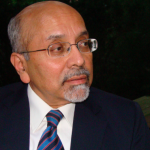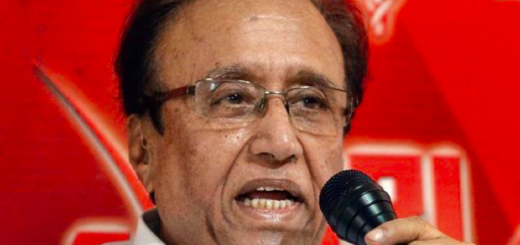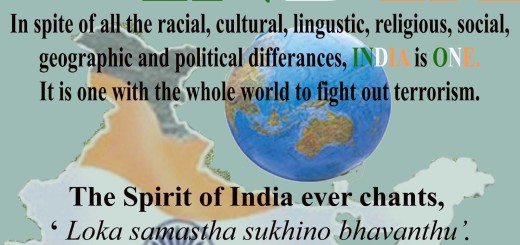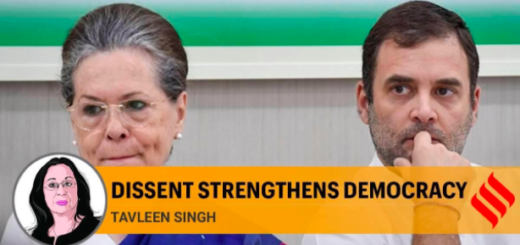Myths, beliefs & history: Why authoritarians always target a country’s Educational Software

 Gautam Adhikari in Edit Page, Times of India August 4, 2018
Gautam Adhikari in Edit Page, Times of India August 4, 2018
Note: Top salute to Reason! But is our reasoning often based on evidence or on inherited, ingrained and indoctrinated values masquerading as unerring religious values and beliefs? No one dare question indoctrinated religious beliefs. Why?
Because these beliefs are often considered to be revealed by a God who is considered the embodiment of Reason! He is not, because in that case there will be only one God and not different gods for different religions. Here lies the fallacy of equating our belief as most reasonable. What is reasonable should be based on concrete evidence not on religious Myths or beliefs passed on as Evidence.
Dare to doubt & question
Hence those who seek TRUTH must start with DOUBTING and QUESTIOING, the example set and taught by Socrates(now called the Socratic method) who was poisoned to death for making the youth of his times “rebels”. Religions that strictly forbid questing articles of faith(man made) are Catholicism and Islam.
For example look at the controversies now going on in the Church about confession to a priest in spite of all the evidences brought out that Jesus never instituted Confession or any other sacraments. What about Jesus himself? He was the top questioner of the priestly class of his time. Nay more, he provoked and encouraged his hesitant listerners to ask questions saying: “Is this not the question in your mind?” and then answering it.
But then how many are the followers of Jesus today in any of the Churches? How many follow him in his simple living and high thinking? Jesus lived the humble life of the Cattle Class without a home and any external show whereas for the leaders of churches today everything is in their external show in dress and parading honorific titles like those of the Pharisees of his times.
 So they have no reasoning for their claims, no evidence except unquestionable myths called organized defined religious beliefs. The sooner people liberate themselves from them, the better it is for them. james kottoor, editor, ccv.
So they have no reasoning for their claims, no evidence except unquestionable myths called organized defined religious beliefs. The sooner people liberate themselves from them, the better it is for them. james kottoor, editor, ccv.
Please read below the Hindu Editorial
We all like to believe that what we believe is right. Most of us also imagine that our beliefs are founded on reason, even as that reasoning flows from inherited as well as nurtured values. But are all those values based on evidence? Or is a part of our values system structured on myth?
Philosophers deal with such issues better than the rest of us can given constraints of time, space, and varying levels of comprehension. But, in today’s global state of confusing uncertainty over what is true and what is fake, it may be important for each one of us to try to understand how values-based reasoning shapes our minds to arrive at social, economic and political positions that lead us to agree or disagree with one another. Values matter. But which value we support or oppose might depend on our ability to subject all values to questioning.
Extremists at the far ends of the political spectrum don’t or are unable to do that. Doubt is not a value they cherish. For instance, those who believe that an entity called the ‘white race’ is both superior to and endangered by coloured races are highly unlikely to ask whether the myth of race based on skin shade has ever been a proven fact. Or, take extreme nationalists worldwide. Not for them to examine the all-too-recent history of the nation-state or the personification of ‘nation’ as motherland and fatherland for geographically delineated clusters of people.
If you are a hard-core believer, doubt is your enemy. That’s an axiom shared by racists, cultural crusaders, extreme nationalists and religious fanatics of every kind. It’s why few believers dare to go outside their chosen bubble of reading or imbibing information from books and the regular or social media. Fantasy sustains their beliefs, even when they read fantasy.
Writing in the NYT last Monday, the playwright Ian Allen explored the science-fiction reading habits of white supremacists. One such popular novel is Ward Kendall’s ‘Hold back this day’, which creates a future in which an all-powerful world government has forced people everywhere to unite under one religion and through enforced race-mixing has turned all humanity into a race of brown-skinned people. Another has Aryans colonising Mars into a paradise for whites. The Frenchman Jean Raspail’s 1973 novel ‘The camp of the saints’ remains at the top of the white supremacist bestseller list. It warns of the dangers of immigration and begins in Belgium where priests are encouraging the adoption of Indian children. Later, Arabs and other non-whites join the Indians in a million-strong brown mob to invade France.
Words can reinforce belief through fear and rage. And words glorifying myths mark educational patterns in places where racists, bigots, fundamentalists and other fanatics dominate. That may be one reason why authoritarians always target a country’s educational software, like history and science textbooks, as they rise to power. Words of history as grandiloquent mythology and the delegitimisation of scientific inquiry are weapons aimed at minds.
The nation-state of India at its creation as a constitutional democratic republic in 1950 was a unique experiment in history. The framers of the Constitution through much debate settled on an idea of a canopy nation in which hundreds of millions of people coming from enormously different ethnic, religious and linguistic backgrounds would live together under one flag fluttering in a breeze of tolerance and diversity. No such nation of this size and diversity, to say nothing of extreme poverty and illiteracy, had been attempted before within a democratic framework.
The idea took root and on the whole succeeded beyond expectation. But not without challenge. Today the challengers are in power. They swear by a historically unsustainable concept of a ‘Hindu’ nation existing for millennia. The believers don’t ask whether any inhabitant of the land in that ancient millennium, or at any time until at best two or three hundred years ago, would answer to a singularly defined ‘Hindu’ religion. Instead, their intellectuals create myths they call history.
Well, history is bunk, said Henry Ford. I guess until you’re forced to live with its consequences …(DISCLAIMER : Views expressed above are the author's own.) Gautam Adhikari has been Executive Editor of The Times of India. He was the founding Editor of DNA (Daily News & Analysis), Mumbai, and has served in the World Bank in Washington DC as a Senior Consultant. His books include The Intolerant Indian: Why We Must Rediscover A Liberal Space (2011) and Rolling Stones: Selected Writings (2009).
















